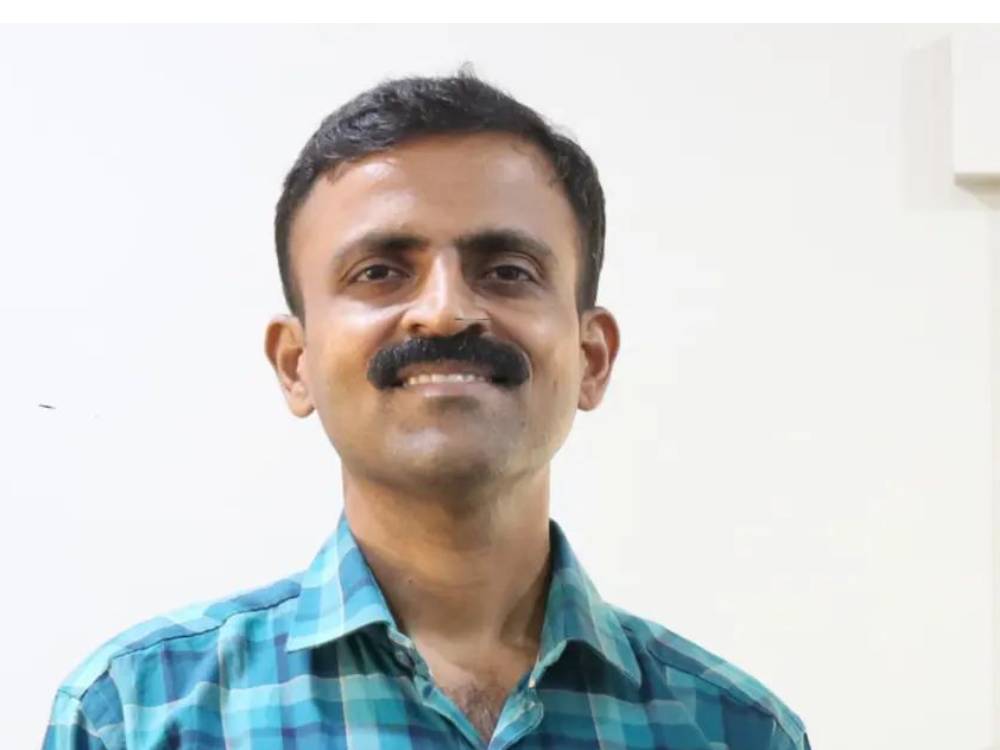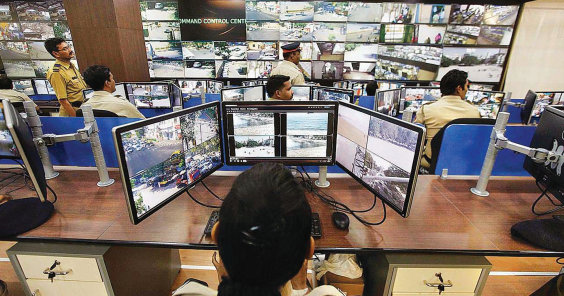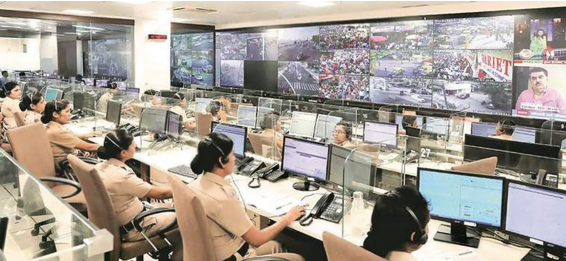Gajanan Kadam is the Senior Inspector of the Cyber Crime police station, Navi Mumbai. Since assuming his role in June 2023, Kadam has demonstrated unwavering dedication to combating cybercrimes and championing justice for all involved parties. Through his proactive efforts, he has played a pivotal role in raising awareness about the complexities of cyber threats and empowering individuals to safeguard themselves in the digital landscape. In a candid interview with Satya Swaroop, Managing Editor of The Mumbai PROTECTOR, Gajanan Kadam shares his experiences, insights, and initiatives in the ongoing battle against cybercrime.
Tell me a little about yourself.
I have a degree in Chemistry, and I have always been interested in facts and solid evidence. That is why I got into cybercrime and fraud investigation. In this field, every action leaves a clear trail of evidence, like tracing money movements or finding digital clues. My journey started in Gadchiroli, a nexel area, where I saw how important technology is in fighting crime.
I helped set up Maharashtra’s first cyber police station in rural area, in Satara in 2017. This was a big step in making our State safer from cyber threats. Working with IG Suhas Warke and SP Sandeep Patil was a privilege.
Overall, I have moved from studying science to fighting cybercrime because I believe in using technology and knowledge to protect people and uphold the principles of justice.
Has this been your passion since your time in Satara?
My passion and dedication to cybercrime investigation have remained unwavering since my tenure in rural Satara. Over the past ten years, I have immersed myself in this field, constantly refining my skills and broadening my knowledge of cybersecurity and digital forensics.
From the onset, when I played a role in setting up Maharashtra’s inaugural cyber police station, to my ongoing efforts in fighting cyber threats, my journey has been fuelled by a profound passion for using technology to uphold justice and safeguard digital integrity under the able guidance of honorable CP navi Mumbai
Have you had any prior experience in Mumbai
before your involvement in cybercrime
investigation?
Our journey began in Mumbai. He preferred to delegate to younger team members who were more tech-savvy. My experience in Mumbai was somewhat limited as I mainly focused on learning crucial cyber policing skills. I completed a seven-day cyber policing course at the BKC Police Station to equip myself with the necessary expertise.
When did you become part of the Cyber Crime police station in Navi Mumbai?
I joined the Cyber Crime police station in June 2023, right when the station was established. Our primary focus is tackling cyber fraud from Panvel to Airoli.
What is the average
number of complaints your Cyber Crime police station receives?
On average, our Cyber Crime police station receives approximately 10-12 complaints daily. These complaints encompass a wide array of cybercrimes, ranging from financial scams to identity theft and online harassment. Additionally, the reported losses associated with these complaints typically amount to between Rs 1 and 2 Crores per day, underlining the substantial financial impact inflicted by cybercriminals on individuals and businesses within our community.
How many convictions has your Cyber Crime police station secured thus far?
Given the nascent stage of our operations, we have not gotten any convictions yet because cybercrime cases are very complicated. They often involve people from different places, which makes it hard to bring them to court. Plus, the legal process takes a long time. We are hoping to see some convictions in about next three years, once everything goes through the court system.
But it is not just about catching the bad guys. Sometimes, they are in other States, which makes it even harder. And even if we do catch them, there is no guarantee they will show up for their court dates after they are released on bail. So, it is a tough situation all around.
Does freezing of the
account help in
combating cybercrime,
and what techniques does your Cyber Crime police station deploy for this purpose?
Freezing accounts is a key part of our fight against cybercrime. When people report fraud through the national cybercrime reporting portal, we jump into action. We start by tracking where the money is going.
If we find any suspicious transactions or accounts, we freeze them right away. This helps stop the bad guys from moving more money around and gives us important evidence to use against them.
We utilise a national cybercrime reporting portal established by the central government. Through this portal, we log entries to report instances where money has been stolen or lost due to cybercrime. Subsequently, we conduct investigations to trace the flow of funds and take swift action to freeze relevant accounts associated with illicit activities and protect the people who have been scammed.
Overall, freezing accounts is a powerful tool in our toolbox for fighting cybercrime and making sure justice is served.
How much time does it typically take for your Cyber Crime police sation to trace the flow of money and initiate necessary
actions?
Within the crucial first three hours, we swiftly trace the flow of money and commence our investigative efforts. We promptly notify all relevant parties, including banks, via email, outlining the necessary procedures to be followed. Our dedication extends to working through the night if needed, ensuring immediate response to any fraud reported, even during late hours.
In addition to our enforcement actions, we actively engage in proactive awareness campaigns under the guidance of Collaborating with the Commissioner of Police Navi Mumbai, shri Milind Bharambe sir, we strive to educate the public about cyber fraud risks. We believe that prevention is key, as convictions often come too late to fully address the harm caused. By promoting vigilance and digital literacy, we aim to safeguard the community against cyber fraud.
What are the physical outreach and awareness campaigns that have been launched?
We have implemented various strategies to raise awareness, including programmes in schools, colleges, and a notable exhibition. Our digital presence has been enhanced through focused campaigns, with a dedicated team managing creative posts on platforms like Facebook and Instagram. Additionally, we have established a WhatsApp Business Account for direct communication.
In our content approach, we ensure diversity, alternating between topics like cybercrime and narcotics awareness. We also prioritise reaching out to specific demographics, such as women and senior citizens.
Following a fraud, our immediate actions include filing an FIR, freezing the account, and striving to recover the victim’s funds. Our focus then shifts to identifying and apprehending the culprits.
How many culprits have your Cyber Crime police station successfully
convicted thus far?
While our Cyber Crime Cell has successfully detected numerous culprits involved in cybercrimes, securing convictions remains a complex and protracted process. To date, we have identified approximately 26 individuals linked to various cyber offences. It is worth noting that a significant portion of the stolen funds associated with these cases has been successfully recovered, thanks to our diligent efforts.
However, the challenges essential in prosecuting cybercriminals extend beyond mere identification. Despite our proactive measures, we encounter limitations in our ability to accelerate the legal proceedings, particularly when dealing with the banking sector. While we promptly notify banks of suspicious activities and initiate account freezes, any delays in their response are beyond our control.
However, we remain firm in our commitment to seeking justice and holding perpetrators accountable. By collaborating closely with law enforcement agencies and forging strategic partnerships with financial institutions, we aim to streamline the process and bolster our effectiveness in combating cybercrime.
What has been your
experience working in the Cyber Crime police
station?
My experience here has been fulfilling, although it is accompanied by a sobering reality. Many individuals who seek our assistance are understandably exhausted and emotionally drained. The relentless pursuit of wealth often leads them into distressing situations, where they plead for our help in recovering their lost funds. I vividly recall cases where individuals have suffered substantial losses, such as one man who lost Rs 1 Crore 92 Lakhs and another who lost Rs 6.5 Crores.
This is heart-wrenching. Do you find satisfaction when cybercriminals are apprehended?
Apprehending cybercriminals feels great, but getting victims their money back can be tough. Often, the stolen funds have bounced around different accounts, so we can only recover part of what is lost. Still, we are determined to help victims as much as we can.
We keep things clear and simple for them, explaining every step of the investigation. We know cybercrimes can be upsetting, so we are here to support victims through it all. We aim to give them the tools and information they need while we work to get justice.
Is this police station solely focused on cybercrime? Are the awareness
programmes yielding an impact?
This police station is solely dedicated to fighting cybercrime. It operates directly under the Commissioner of Police. Our mission is crystal clear: to tackle the ever-changing cyber threats and protect our community’s digital safety.
While our physical campaigns have made a positive impact, reaching every individual in the community remains a challenge. This limitation has led us to prioritise digital campaigns, which have proven to be significantly more effective. With the widespread use of smartphones for various purposes such as bill payments, displaying vaccination certificates, and accessing government IDs like Aadhaar and PAN cards, digital platforms offer a broader reach and higher engagement potential.
Do you have any
memorable success stories or standout cases you can share?
One case that stands out involves a significant breakthrough. We suspected some people in the banking sector might be involved in cybercrime, but we did not have solid evidence until this case.
We found that the KYC details of a particular account were under one person’s name, but the phone number and email belonged to a former banker. Digging deeper, we discovered that the person who verified the KYC worked for this ex-banker. It turned out to be a sophisticated scheme where people were tricked into giving their KYC details, thinking they were getting loans.
Most of the victims were from financially vulnerable backgrounds. They opened current accounts, thinking they were doing legit transactions. But their accounts were used for fraud. This highlights how loose banking policies on current accounts can fuel cybercrime.
This case shows how complex cybercrime can be and how crucial it is to investigate thoroughly and work together. By uncovering this scheme, we stopped the fraud and brought the culprits to justice, protecting vulnerable people in our community.
Could imposing
restrictions or limitations on current accounts be a practical solution to curb cybercrime?
Regulating current accounts could be a positive move. The Reserve Bank of India (RBI) could set clear rules and assign managers to keep an eye on these accounts, helping to reduce the risk of illegal activities. For example, if a large amount like Rs 5 Crores moves in and out of an account quickly, especially if it is new, that is a red flag. But monitoring every transaction is tough with our large population.
Controlling how much hard cash is circulating could also help with cybersecurity. The government has been trying to introduce policies but people oppose them because of the black money that they hold. Finding a balance between regulations and public welfare is crucial as we continue fighting cybercrime and preserving financial integrity.
Would you like to add more to what you have shared?
It is vital to remain vigilant against unwanted digital solicitations, which are often used to exploit individuals’ vulnerabilities for fraudulent gain. If you receive messages or communications from unknown individuals on platforms like WhatsApp, Telegram, or Instagram, urging you to participate in schemes, download apps or files, or click on links, exercise caution, and avoid engaging with them. These tactics are commonly employed to manipulate individuals into making transactions, divulging personal information, promising unrealistic returns, or exploiting fears.
It is essential to avoid conducting any financial transactions with unknown parties, particularly if promises of doubling or tripling your money are involved. Many of these schemes involve organised groups, with different individuals handling various aspects of the fraud, from initial contact to receiving and withdrawing funds. Unfortunately, our efforts to combat these crimes are often hindered by delays caused by our reliance on third-party entities like banks and SMS services.
Moreover, catching these culprits poses significant challenges, as they frequently operate from foreign countries like Cambodia, Laos, Dubai and Vietnam. Their international presence makes it more difficult to track and apprehend them, further highlighting the need for extreme caution and alertness when engaging in online interactions.






